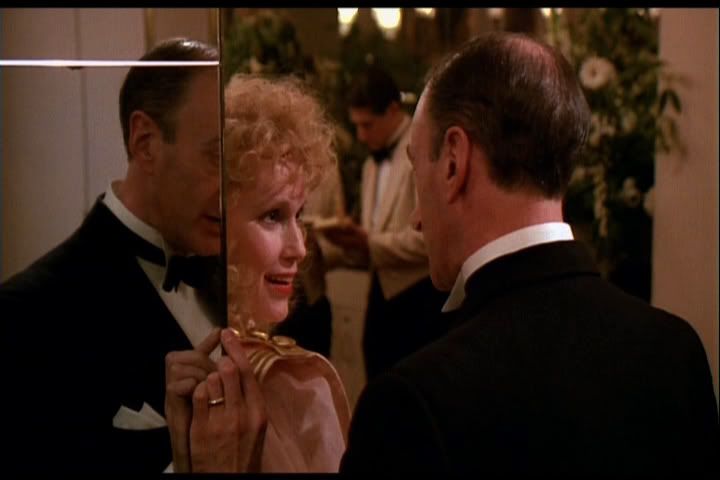
It's often been said that Woody Allen's version of New York is strictly a pretend New York, a world that exists only in his mind and is populated by exaggerated versions of real-life people. Strangely, this is most often said as a criticism. In fact, this aspect of Woody's work has given him many of his best films, and I think it's fair to say that he embraces the fantasy of his vision of New York. His best films have the air of nostalgia for a time that never was, a mix of poignancy and wit that makes these stories feel incredibly real as a whole, even as we realize that the individual details are greatly exaggerated or skewed. Nowhere has this been more true in his oeuvre than in Radio Days, his loving and deeply moving tribute to the dramatic importance of the radio in his childhood. Radio Days is narrated by Woody, and structured as a series of vignettes about radio celebrities and anecdotes about growing up in the radio era, with Woody's childhood stand-in (a very young Seth Green) and his extended family at the center. Nostalgia and remembrance have always been central to Woody's aesthetics, and this is his best distillation of those themes yet.
This is another extremely warm film from Woody, building on the bittersweet atmosphere of Hannah and Her Sisters, balancing poignant reminiscence with a distance and humor that keeps it from becoming too sentimental. There are too many great scenes to name here, and Woody's wry narration holds everything together whether he's recounting a glamorous celebrity legend or a charming childhood memory. The opening scene, in which two burglars find themselves as contestants on a radio show in the midst of a robbery, sets the tone of gentle absurdity that winds through the film. Several of the stories reappear throughout the film, providing at least some through-line for the narrative. Mia Farrow gives a great turn as the wannabe star Sally, yet another chameleonic performance as she puts on a thick and squealing New Yawk accent. And the family that forms the film's centerpiece is teeming with wonderful caricatures. Dianne Wiest shines as ever as the spinsterish aunt who dates a succession of losers but can't seem to find a good guy. Julie Kavner and Michael Tucker are great as Woody's parents, affectionately bickering and sparring and poor, but with a clear love for one another. Best of all is Josh Mostel as Uncle Abe, who has a connection in the fish markets and thus keeps the family constantly supplied with more fish than they'd ever want. He has a wonderful scene when he sets out to tell off the communist next-door neighbors for blasting their radio and working on the sabbath; he winds up coming back spouting communist rhetoric and decrying religion instead. There's a wealth of such incident and character here, all of it packed with detail and nuance, humor and emotion.
This is yet another entry in a near-unbroken string of masterpieces Woody Allen made throughout the late 70s and 80s. Am I getting tired of saying that yet? Not really, if it means I get to keep seeing such wonderful films. Radio Days looks at the past through the filters of nostalgia and imagination, looking at the world as it was from a child's eye view. It's a world where German submarines cruise just offshore, the sexy substitute teacher dances naked in her window, and mob hitmen turn witnesses into radio stars instead of whacking them. There's so much going on here that it all flies by in a dizzying whirl, a 90-minute trip into an imaginary past and a visit with its wild denizens. When the final scene, the delirious New Year's bash on the roof of a Manhattan club, finally closes on the empty roof and a few stray snowflakes falling, it produces a simultaneous feeling of satisfaction and sadness over the loss of this bygone era and all it represented.

2 comments:
Woody is always on firmer ground when he's going for Fellini rather than Bergman. Radio Days is his Amarcord, and his affection for these characters is infectious and truly touching.
Yea, I can agree with that. I don't know if it's a Fellini/Bergman thing, but Woody is definitely at his best when he shows the most affection and warmth for his characters. That's why this one and Hannah and Her Sisters are among his greatest works for me. They're charming, funny, and remarkably poignant. There's not much formal similarity between this and Amarcord, but the generosity of spirit and the cartoony approach to nostalgia is definitely common to both films.
Post a Comment